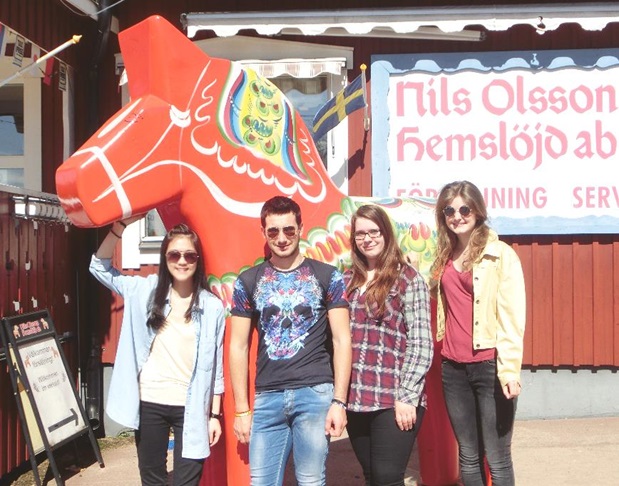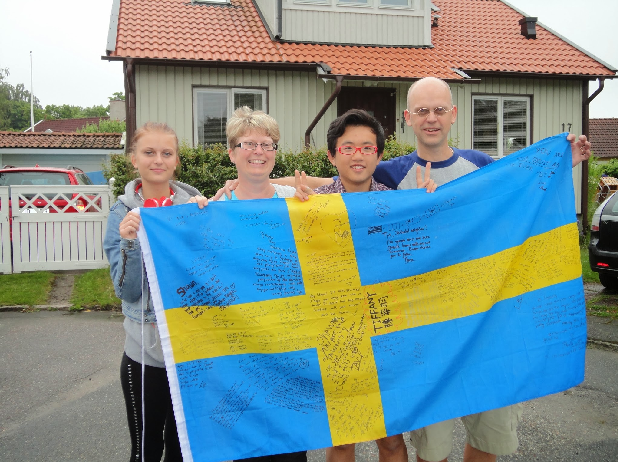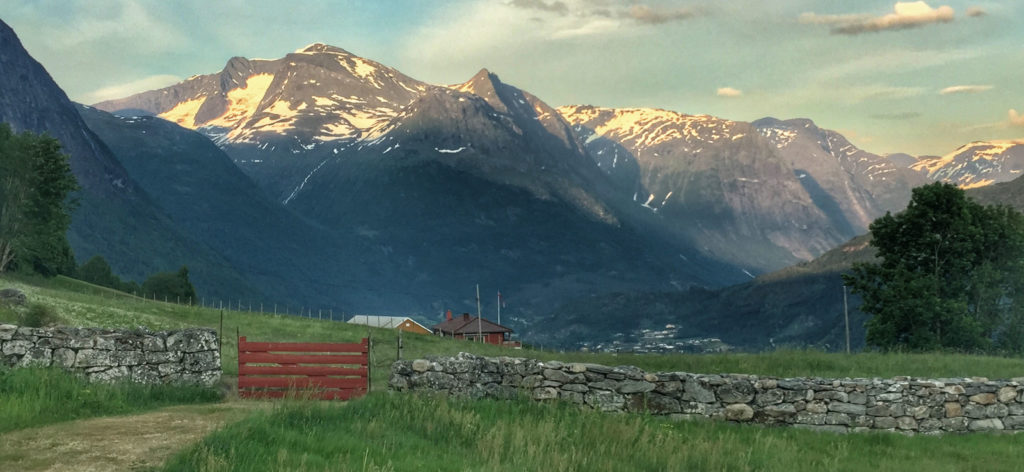School Immersion in Sweden – 15 -18 years old – 2 months to 1 academic year
Our high school programme in Sweden is aimed at all students aged between 15 and 18 who are motivated to study for a period of 2 months to 1 academic year in this unique and fascinating country, and enjoy an unforgettable experience!
You will attend a Swedish high school and share the daily life and lifestyle of your host family. This programme offers a real linguistic and cultural immersion in Swedish life.
No previous knowledge of Swedish is necessary (beginners accepted), but a good level of English is required.
Sweden is the ideal destination for lovers of nature and outdoor activities, and for all those who want to experience something out of the ordinary and off the beaten track!
Why study in Sweden?
- An excellent education system, encouraging critical thinking and individual reflection
- A high quality of life – A clean and safe environment
- Diversity andequality are fundamental values of Swedish society
- Environmental protection and sustainable development are an integral part of the Swedish way of life
- Swedes are friendly, respectful, dynamic and cultured people who have a very close relationship with nature. They enjoy spending time outdoors in all seasons
- Everyone speaks English
About Sweden
- population: 10.1 million
- Capital: Stockholm
- 70% of the country is forested, with nature everywhere, even in the largest cities
- Economic dynamism – internationally renowned companies: IKEA, H&M, Spotify, Tetra Pak…
- Cultural characteristic: the famous “Fika” break or “the art of the social coffee cup”
- Spectacular scenery, northern lights
- Excellent public transport network
Placements can take place anywhere in Sweden, although the majority are in the south of the country. Students may be placed in a large city or in a more rural area. Students going away for a semester or an academic year can make a regional choice.
All Swedes speak English, but High School classes will be taught in Swedish. It is therefore strongly recommended that you prepare for your stay by taking online Swedish courses before you leave.
You attend a ‘gymnasiet‘ (state school) which corresponds to the last 3 years of secondary school (1st, 2nd and 3rd or 1:an, 2:an and 3:an in Swedish). Your choice of school depends on where your host family lives.
You will be placed in 1st or 2nd according to your age, level and availability (no placement in 3rd, which is an exam year).
Students generally take 9 subjects. Some subjects are compulsory , such as maths, English and physical education. The others are chosen according to your language level, academic orientation, academic results and availability. We cannot guarantee that you will be able to choose your school subjects.
The choice of subjects is varied: foreign languages, Swedish, history, social sciences, economics, business, technology, natural sciences, etc.
The foreign languages most commonly taught, apart from English, are Spanish and French. Latin and Chinese are less common.
Sports generally played in Scandinavian countries: football, hockey, handball, floorball, skiing.
Important points to note
- Swedish schools are not obliged to accept exchange students. Refusal may be due to full classes or a lack of public funding for non-Swedish students.
- Students may be assigned to either the academic or vocational stream, depending on the number of places available. Although we aim for enrolment in one of the six academic programmes mentioned below (Swedish education system), placement in the vocational stream may sometimes be necessary.
- The school director chooses the year of study in which the student is placed, depending on age, language level and availability.
- Students will not receive grades or a diploma in Sweden. Instead, they will receive a report indicating the subjects taken, but this does not constitute an official transcript.
- Students should not expect specific courses to be offered. Access to programmes and subjects depends entirely on what the school is offering at the time of your stay.
- Students cannot bring compulsory courses from their home country to take during the programme: Swedish schools expect full participation in local studies.
Swedish language courses
It is strongly recommended that you start taking Swedish courses before you leave and continue on arrival to help you integrate more easily. Your host family and your local correspondent will be able to advise you on the best options.
If you are going for a semester or a school year, you can indicate a regional choice (at an extra cost) when you enrol:
- North
- Central
- South
Please note : this regional choice is not guaranteed. If our local partner is unable to place you in the chosen region, the supplement will be refunded.
Students leaving for 2 months or a school term cannot make a regional choice. They can be placed anywhere in the country.
In Sweden, schooling is compulsory from the age of 6 to 16. From 16 to 20, young people attend a gymnasiet (the equivalent of the lycée in France or the last 3 years of secondary school in Belgium). The gymnasiet prepares students for university. It offers both academic and vocational courses:
Academic programme :
- Economic programme
- Natural science programme
- Social science program
- Technical program
- Humanistic program
- Esthetic program
Vocational stream :
- Health and social care
- Business and administration
- Natural resource use
- Industrial technology
- Hotel and tourism
- Restaurant and food industry
International students usually follow courses in the academic stream, but may be placed in the vocational stream.
The school year is divided into 2 semesters: August to December and January to June. Classes generally run from 8am to 3pm. All courses are taught in Swedish, with the exception of language courses.
The Swedish education system is renowned for its excellence and encourages critical thinking and individual reflection. It also gives students a great deal of freedom. Teachers are generally very open and relaxed, and the teacher-student relationship, which is much more informal than in Sweden, is based on mutual respect and trust. On the other hand, this freedom implies greater responsibility on the part of students, who have to be self-disciplined to hand in their homework on time, without strict supervision.
Extra-curricular activities and hobbies are not practised within the schools, but in sports clubs, organisations or independent associations. We recommend that students take part in at least one activity outside the classroom and their host family. This is a good way of meeting people and gaining a better understanding of Swedish society.
The school holidays take place according to the following schedule: 1 week in October/November, 2 weeks at Christmas/New Year, 1 week in February, 1 week in April.
Host families are at the heart of the programme. They choose to welcome a student to share their culture and way of life, and select you on the basis of your application to ensure that you fit in well.
Families come in all shapes and sizes: with or without children, blended, single-parent, retired or younger. It’s not the composition of the family that’s important, but their willingness and motivation to share their culture with you.
Daily life reflects Swedish culture: everyone helps out with domestic chores (cooking, cleaning, laundry, etc.), and independence and confidence are encouraged from an early age. The days are often full and evening meals are a special time to get together.
You will be accommodated in a single or shared room. Half board is provided during the week, and full board at weekends and during school holidays.
In the Nordic countries, you should also expect the journey to school to be long, sometimes up to 1 hour 30 minutes. It’s important to be prepared for this.
The local correspondent is an experienced person who selects the host families and stays in regular contact with the students. As they are able to act quickly in the event of a problem, they are your key contact during your stay.
He or she will be on hand to answer any questions you may have once you arrive and to help you with any formalities. Regular communication will be established with your host family and the school to ensure that your experience goes as smoothly as possible.
Finally, you will be given an emergency number so that you can contact someone if you have an urgent problem.
A 4-day/3-night orientation camp is offered in Stockholm at the beginning of the stay, in August and January.
This course provides an opportunity to prepare for life and culture in Scandinavia and to meet the other international students taking part in the programme. Visits are also included in the programme!
The course price includes :
- 3 nights’ accommodation in a youth hostel (shared rooms)
- Half board (morning and evening meals)
- A programme of activities
- Transfers from Arlanda airport to youth hostel
- Transfer to the host family
It does not include
- Lunch
- Personal expenses
If you are not taking part in the course in Stockholm, your local coordinator will organise an orientation meeting on your arrival.
Our local partner, together with youth mental health specialists, has developed a programme to strengthen the resilience of international students. This proactive support accompanies not only the students, but also the host families, local coordinators and parents, in order to better prepare them for the various stages of their stay.
Interactive workshops and practical exercises are offered:
- Before departure, to prepare yourself properly;
- After arrival, to make it easier to adapt;
- Before the holiday and before returning home, to manage transitions.
The aim is to develop self-confidence, stress management, communication and the ability to adapt to a new culture.
This programme is part of a global approach based on three pillars:
- Resilience Training: raising awareness, providing tools and improving well-being.
- Communications: standardising, inspiring and sharing best practice.
- Operational Alignment: strengthening skills, avoiding discrimination and guaranteeing student safety.
- Students must be aged between 15.5 and 18 at the start of their programme. Students arriving in August cannot celebrate their 19th birthday during the year of their arrival.
- Have a communicative level of English, if no knowledge of Swedish (students must obtain a minimum score of 215 in the ELTiS test)
- Have obtained good academic results over the last 3 years (“C” average – 60%)
- Demonstrate the motivation, maturity, adaptability and open-mindedness that are the real keys to a successful stay
Students who have already obtained their diploma can take part in this programme.
Do you meet the conditions for participation?
- Fill in the pre-registration form as soon as possible
- When we receive it, we’ll send you a provisional confirmation, including the total cost of the stay, a request for payment of €100 (for the language test and the motivation interview), and the full application form for the chosen programme. We will also ask you to send us a copy of your school reports for the last 2 years.
- We then invite you to come and take the language test and interview at our offices in Brussels or Paris. This costs €100 and is payable on receipt of the pre-confirmation. This amount is non-refundable, but can be deducted from the balance of your stay if you are definitively enrolled and accepted on the programme. Part 1 of the application form must be completed and brought with you to the interview.
- We will confirm the result no later than 8 days after our interview
- If the interview is positive, we ask you to pay a deposit of 25% of the total cost of your stay (with a minimum of €1800) and to complete all the elements of your application, which includes letters of recommendation from your teachers and other information needed for us to study your application on site. As soon as your application is complete and we have received payment of the deposit, we will forward it to our partner.
- Final acceptance to the programme is given by our partner
- Once your application has been accepted, our partner begins the search for and selection of a host family and school
The deadlines for submitting complete applications to our partner are :
- 30/04 for an August departure
- 1/10 for a January departure
Please note: late registrations will be accepted subject to availability, but a supplement will be applied.
The online booking form must be received at least 3 weeks before the application deadline.
The programme includes travel insurance provided by our partner: accident, health care, luggage, emergency dental care, medical evacuation, repatriation and civil liability.
We will inform you of your arrival airport once we have received the details of your host family.
Participants are met on arrival at the airport closest to the family’s place of residence.
For participants in the orientation camp: we will send you practical information.
Dates 2025-2026
Orientation course dates: to be confirmed
- School year: mid-August – mid-June
- Term 1: end of October – end of January
- Semester 1: mid-August – end of December
- Term 2: mid-January – end of March
- Semester 2 : mid-January – mid-June
- 2-month programme: end November – end January
Prices 2025-2026
| Scolarité, logement et repas, tous frais d'inscription compris | |
|---|---|
| Durée | Tarifs |
| 2 mois | € 5.750 |
| 3 mois | € 7.795 |
| 1er semestre scolaire | € 8.795 |
| 2e semestre scolaire | € 9.795 |
| 1 année scolaire | € 11.895 |
| Suppléments | |
| Stage d'orientation (optionnel) - uniquement en août | € 550 |
| Frais d'inscription tardive | € 400 |
The above rates include:
- Pre-application interview
- School registration fees
- Accommodation with a host family, half board during the week and full board at weekends and during school holidays
- Assistance, support and follow-up from the local correspondent throughout the stay
- Monthly contact and evaluation reports
- Official certificate of participation
- Reception on arrival and transfer from the airport nearest to the family’s place of residence to their home
They do not include
- Return journey to the airport closest to the family’s place of residence
- Local transport
- Lunch in the school canteen (300€ to 500€ per semester)
- Pocket money: approximately 250/300€ per month
- School books (it is often possible to borrow them)
- School supplies and other school expenses such as locker fees
- Extra-curricular activities
- Optional orientation course in Stockholm
- Return transfer (often paid for by the family)
Dates 2026-2027 (subject to change)
Departure in August
- School year: 15 August – 13 June
- School term: 15 August – 27 December
- 3 months: 15 August – 7 November*
- 2 months: November – January
Departure in January
- School term: 10 January – 14 June
- 3 months: 10 January – 29 March*
Dates of the orientation course in Stockholm:
- 12 to 15 August 2026
- 7 to 10 january 2027
*Only for students residing in the Schengen area.
Prices 2026-2027
| Tuition, accommodation and meals, all registration fees included | |||
|---|---|---|---|
| Duration | Prices | ||
| 3 months | € 7.850 | ||
| 1 semester | € 10.150 | ||
| 1 academic year | € 11.990 | ||
| Supplements | 3 months | 1 semester | 1 academic year |
| Orientation camp (optional) | € 700 | € 700 | € 700 |
| Special dietary requirements/allergies/health issues | € 400 | € 500 | € 700 |
| Vegetarian diet or allergies to dog or cat hair | € 150 | € 250 | € 500 |
The above rates include:
- Pre-application interview
- School registration fees
- Accommodation with a host family, half board during the week and full board at weekends and during school holidays
- Assistance, support and follow-up from the local correspondent throughout the stay
- Monthly contact and evaluation reports
- Official certificate of participation
- Transfers from the airport or station closest to the family’s place of residence to their home (on the 1st and last day of the programme)
- An orientation session organised by the local coordinator after arrival
- Access to the Educatius Global Youth Resilience Training programme
- Travel insurance (accidents, healthcare, luggage, emergency dental care, medical evacuation, repatriation and civil liability)
Not included:
- Return travel to the airport/station closest to the family’s place of residence
- Local transport
- Lunch in the school canteen (300€ to 500€ per semester)
- Pocket money: approximately 250/300€ per month
- School books
- School supplies and other school fees such as locker fees, for example
- Extra-curricular activities
- Orientation camp in Stockholm (optional)
- Late registration fees (250€), if applicable
























